Federation of Independent Retailers (NFRN)
This page was last edited on at
The Federation of Independent Retailers (NFRN) (formerly known as National Federation of Retail Newsagents) was founded in 1919 and is one of Europe’s largest retail trade associations with over 15,000 independent news and convenience retailers in membership throughout the UK and Ireland.
The organisation presents itself as The voice of the independent retailer. In 2013, as part of it’s ‘Press for Reform’ campaign, it released a statement saying:
“For far too long the news and magazine supply chain has been dominated by publishers and wholesalers with too much power which they wield with no interest other than their own.”1
Tobacco regulation such as the Point of Sale (POS) display ban and proposals for the introduction of plain packaging in the UK have been major campaign issues, for which the Federation received funding from British American Tobacco (BAT).
In 2017 NFRN collaborated with Imperial Tobacco on illicit trade. For more information see Imperial Tobacco
Against the Proposed Rise in the Tobacco License Fee in Ireland
In September 2014, the NFRN wrote a letter to all Members of the Irish Parliament (TDs) asking them to oppose plans for the tobacco license fee to be increased to €500. The organisation believed that retailers were an “easy target” for Government and that the fee might cause legitimate retailers to leave the market.
Repeating arguments often used by the tobacco industry, NFRN Ireland said it is “vehemently opposed to the measure”.
It wrote, “once again legitimate retailers are a soft target for Government whilst criminals profit greatly from the illicit tobacco trade”. Its Public Affairs Manager, Deirdre Drennan, stated that some retailers would decide the profit they were making from tobacco products would now not justify the fee and would choose to no longer sell tobacco. She also warned of the risk of a rise in criminals selling illicit cigarettes to children at “a pocket money price point and face little or no consequence”.2
Against the Regulation of Tobacco and E-cigarettes
In July 2013, when the Medicines and Healthcare Products Regulatory Agency (MHRA) announced its intention to regulate e-cigarettes from 2016, the NFRN announced it would work with the government to ensure members can continue to sell e-cigarettes.3
Lobbying against Plain Packaging
The NFRN provided its members with campaign materials to oppose proposals for the plain packaging of tobacco products. For example, in 2012 the Federation gave retailers a standardised letter “to forward to the Department of Health outlining the devastating effect that plain packs will have on your business and the independent sector as a whole.” The letter summarised the industry’s classic arguments against legislation:
“As a responsible retailer, I fundamentally object to the proposal to introduce plain packaging for tobacco on the grounds that it will:
- Fail on a health basis as there is no empirical evidence to support it;
- Have a hugely detrimental impact on legitimate business;
- Gift market share to the unregulated, illicit market;
- Significantly increase transaction times whilst attempting to retail products not only behind a shutter, but appear in unified packaging; and as a knock on effect
- Significantly increase retailers vulnerability to crime whilst they are increasingly distracted retailing tobacco products.” 4
A NFRN petition, which was designed for customers and staff “to send a clear message to the government”, achieved 235,000 signatures.5
Submission to the Consultation on Plain Packaging
The NFRN made a submission to the government’s 2012 consultation on plain packaging.6
In a strongly worded press release, the Federation challenged the Department of Health to think again about putting tobacco products in plain packs. National Director Ian Smith said:
“It has been extremely disheartening to respond to a consultation which has been authored in such an unapologetically biased manner. The evidence upon which the consultation rests has been taken out of context and misrepresented:
- Figures cited did not appear in the original reports;
- conclusions have been taken from reports that clearly state their own fundamental fallibilities in research methodologies;
- the evidence is not independent (with 20 of the 37 studies included in the Systematic Review written by the authors of this Review while the remainder are penned by authors with well-established links to groups who explicitly support plain packaging);
- and judgements taken as evidence from tobacco control experts for whom the Department of Health is explicit do not need to be ‘impartial or lack an economic or personal stake in the potential findings’.
All this is patently outrageous.”
(Smith refers to the independent scientific review here commissioned by the Department of Health as part of the Government’s consultation. The review examines the findings of 37 studies that provide evidence of the potential impacts of plain tobacco packaging.7 Also see Plain Packaging in the UK).
Smith stressed that the Department of Health should explore the causes of smoking and how youngsters access cigarettes, and explore:
“viable alternatives such as introducing laws to make proxy purchasing of tobacco illegal for minors, as it is with alcohol, and increasing significantly sentences and fines available to the courts, police and HMRC to properly prosecute and disincentive counterfeiters and smugglers were not being considered as part of the government’s consultation.”
Smith repeated a well-worn industry argument that plain packaging will increase the illicit trade in tobacco products, and put retailers at risk:
“…it will gift market share to the unregulated, illicit market; significantly increase transaction times and costs in shops as it will take staff twice as long to retail tobacco products and worryingly, it will significantly increase retailers’ vulnerability to crime while they are increasingly distracted retailing tobacco products.”5
Imperial Tobacco Quotes NFRN Submission
In its submission to the 2012 Government consultation on plain packaging, Imperial Tobacco utilised information from the NFRN’s 2008 submission to the UK consultation on the Future of Tobacco Control:
“Standardised packaging can also be expected to compromise the ability of smaller retailers to compete because:
- tobacco makes an important contribution to the profitability and viability of smaller retailers, representing around 30 to 40 percent of their turnover;
- 30 retailers earn higher margins on premium brands than on economy brands;
- and it is likely to lead to more consumers switching to buying from large grocery retailers, reducing the viability of small independent retailers for whom turnover from tobacco products is proportionately much more significant.”8
Vocal Against Plain Packaging During Second Consultation
On 26 June 2014, the UK Government announced its second public consultation on the introduction of plain (standardised) packaging for tobacco products. During the Consultation period, set to run for six weeks until 7 August, any party with new evidence or information regarding the anticipated impacts of the proposed plain packaging legislation was invited to submit this for consideration.
On the same day, the Consultation was announced and the associated draft regulations published, the NFRN released a statement urging Members of Parliament not to pass plain packaging regulations in the UK. Reflecting classic arguments made by the tobacco industry against tobacco control legislation, the statement read:
“…There are concerns from newsagents and convenience store owners that the introduction of the policy will simply provide a boost to counterfeiters and the illicit market, which in turn, has a negative impact not only on legitimate and responsible businesses, but on public health too.” 9
Additionally, National President Martyn Brown warned that plain packaging would not prevent children from smoking, and suggested instead that the “government should look at the example set by Germany, which has introduced a successful educational programme in schools to prevent children from smoking.”
Mobilising Retailers and General Public Following Government Announcement in January 2015
In a piece, published on BetterRetailing.com by the editor of Retail Newsagent Chris Gamm, retailers were encouraged to contact their MPs to tell them that plain packaging for tobacco products will harm their businesses.(Image 1)
“Pro and anti-tobacco lobbyists will never agree on the true impact of plain packaging on illicit sales in Australia. But for the government to be playing politics with your livelihood with even the slightest doubt about the harmful consequences is wrong.”
“That is why it is crucial that you use the timing of the announcement to your advantage. Your MP will be working hard to get votes over the coming months. Invite them to your store, tell them about the impact plain packaging would have on your business and show them everything you are already doing to be a responsible retailer.”
Approximately 70 members of the NFRN attended a rally at the House of Commons on Wednesday 11th February 2015. (Image 2) The NFRN met with MPs Nick de Bois and Gerry Sutcliffe to discuss the issue.
During the rally, NFRN president Martyn Brown once again urged retailers to lobby their MPs.12
“Make your MP aware that plain packs will not stop young people from smoking,” he told fellow retailers. “Remind them that counterfeit cigarettes are already a huge and growing problem and that putting tobacco products into plain packs will make this even worse.
“Put pen to paper and write to your MP. Even better, invite your MP to your shop. Talk to your customers and get them to tell your MPs that they don’t want plain packs either.
“Doing so will mean that together we can send clear messages to the government: that consumers are opposed to plain packs, that plain packs will not prevent people from smoking, that the sale of illicit tobacco will just get easier.12
In retail outlets across the country the NFRN placed postcards with misleading images of white plain packs and suggesting that plain packaging legislation will lead to increases in illicit trade, organised crime, and terrorism, loss of tax revenue and more children smoking. On the back of the postcards the NFRN encouraged people to send them to the then Chancellor of the Exchequer, George Osborne (click on thumbnails to enlarge images 3-7). Each postcard back had slightly different text relating to the different images on the front.
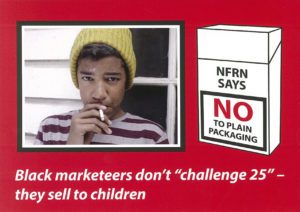
Image 3. NFRN postcard: Illicit traders sell to children
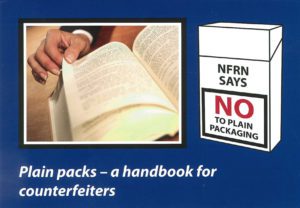
Image 4. NFRN postcard: Plain packaging makes counterfeiting easier
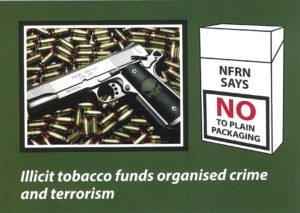
Image 5. NFRN postcard: Illicit trade funds organised crime
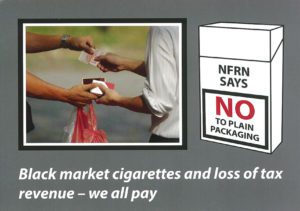
Image 6. NFRN postcard: Loss of tax revenue to illicit trade
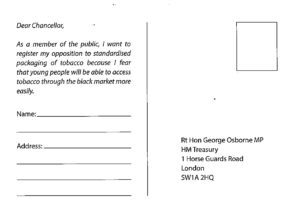
Image 7. NFRN postcard back: Each postcard was addressed to Chancellor George Osborne
Anti-Point of Sale Display Ban Campaign
Funding or No Funding ….
In April 2011 the NFRN admitted it had received funding for the campaign it was running against the proposed POS Display Ban from unnamed tobacco manufacturers, but, when asked by The Guardian to identify the companies, the NFRN refused “as this would breach perfectly reasonable confidentiality”. Suspicion fell on BAT because of its existing links with the PR company Hume Brophy, employed by both the NFRN and BAT.
On 27 April 2011 this was categorically denied by BAT.13 The company stressed its
“high standards of behaviour and integrity wherever our businesses operate.
To accuse us of underhand tactics and the funding of an independent retailer organisation (the NFRN) … is untrue.”
However, just a day later on 28 April 2011 at BAT’s annual general meeting, company chairman Richard Burrows confirmed the tobacco group had funded the NFRN and had met with them and with Hume Brophy to discuss the campaign.14
BAT has denied providing any funding the NFRN to campaign against plain packaging. Asked by ASH “whether BAT has provided any funding or support, either direct or indirect, to lobbying and campaigning activities by third parties including the NRFN against standard packaging of tobacco products”, Simon Millson, Group Head of Corporate Affairs for BAT replied: “In the UK, BAT has not supported the NFRN specifically for any campaigning on plain packaging. We have only contributed our normal annual subscription.”
“Puppet” of the Tobacco Industry
NFRN’s links with the tobacco industry have been criticised. “The federation is a puppet of the tobacco industry,” Colin Finch, the NFRN’s president until 2008, told The Guardian, accusing the industry of using “retailers to legitimise their campaign”. He added: “The whole situation with the federation and the tobacco industry is out of kilter,” said Finch, who opposed the display ban. “The federation’s code of ethics has been poisoned by the tobacco industry.” He also said the NFRN worked too closely with the Tobacco Manufacturers’ Association15
See also:
- Philip Morris’ PR Campaign Against the Display Ban
- Philip Morris’ Regulatory Litigation Action Plan Against the Display Ban
NFRN Sends Letter of Complaint to Prime Minister
In June 2011, the NFRN sent a letter of complaint to Prime Minister David Cameron about alleged “inappropriate conduct” of public health minister Anne Milton. She had attended an All-Party Parliamentary Group on Smoking & Health’s 40th-anniversary event for ASH, where – according to the NFRN national president Kieran McDonnell – she credited the vice-chair, Kevin Barron MP for his help “behind the scenes”. For the NFRN this was a reason “to call into question the manner in which recent tobacco display ban legislation has been made” and to ask for an investigation.16
This complaint came four months after the NFRN itself had been the subject of investigation by The Observer,17 which claimed the NFRN’s display campaign had been directed and funded by the tobacco companies.
Amanda Sandford, research manager with ASH, wrote to The Grocer that the claims made by the NFRN of inappropriate conduct by the public health minister held no substance. She confirmed Milton’s attendance at the event but stressed she had not been presented with an award by ASH, and that Kevin Barron, MP was “well known to have worked hard both in public and behind the scenes to get cross party support for smoke-free legislation”. She also referred to the recent exposure in The Independent about the NFRN taking money from BAT.18
In response Kieran McDonnell wrote to The Grocer asking for a retraction from Amanda Sandford stating that the NFRN was never “exposed” in any publication “for concealing support from BAT”.19
NFRN Seeks Access to Primary Authority Scheme
In July 2011 the NFRN called on the government to give independent retailers a national voice in driving local trading standards legislation and enforcement. MP Mark Prisk, business and enterprise minister, was asked at a meeting of the Local Better Regulation Office (LBRO) business reference panel held on 4 July to extend the quango’s Primary Authority scheme to include trade associations.
This meeting followed the Government’s launch of a consultation on re-creating the LBRO as a streamlined body within the Department for Business, Innovation and Skills (BIS), working with regulators, local authorities and business. NFRN president, Kieran McDonnell, said that the NFRN supported the retention of the LBRO as an independent body, noting “Our only concern is that LBRO be allowed to continue to operate (as far as the business industry’s relations with them go) as it currently does”, continuing that if this could be facilitated with the BIS “then we would support that too, but there are questions as to whether this would be possible”.20
- See EU Better Regulation for more information about the tobacco industry’s role in these rules.
TobaccoTactics Resources
- PMI Mobilised Support from Retailers
- Opposition Following January 2015 Announcement
- It will Cost Small Businesses
- PMI’s Anti-PP Media Campaign
- Philip Morris’ PR Campaign Against the Display Ban
- Alliance of Australian Retailers
- Association of Convenience Stores
- All Party Parliamentary Small Shops Group
- Federation of Wholesale Distributors
- Petrol Retailers Association
- Scottish Grocers’ Federation
- Scottish Wholesale Association
- Tobacco Retailers’ Alliance